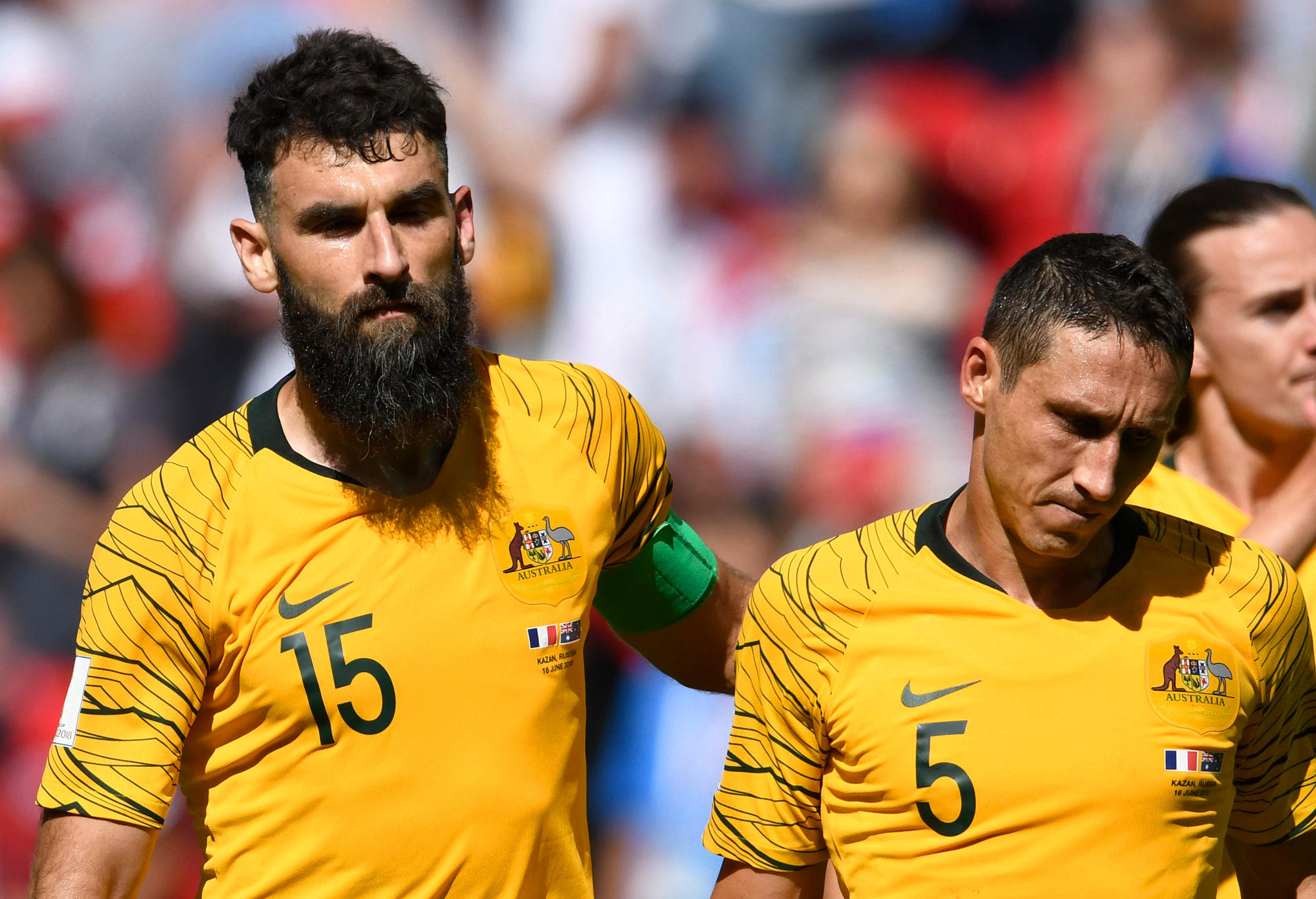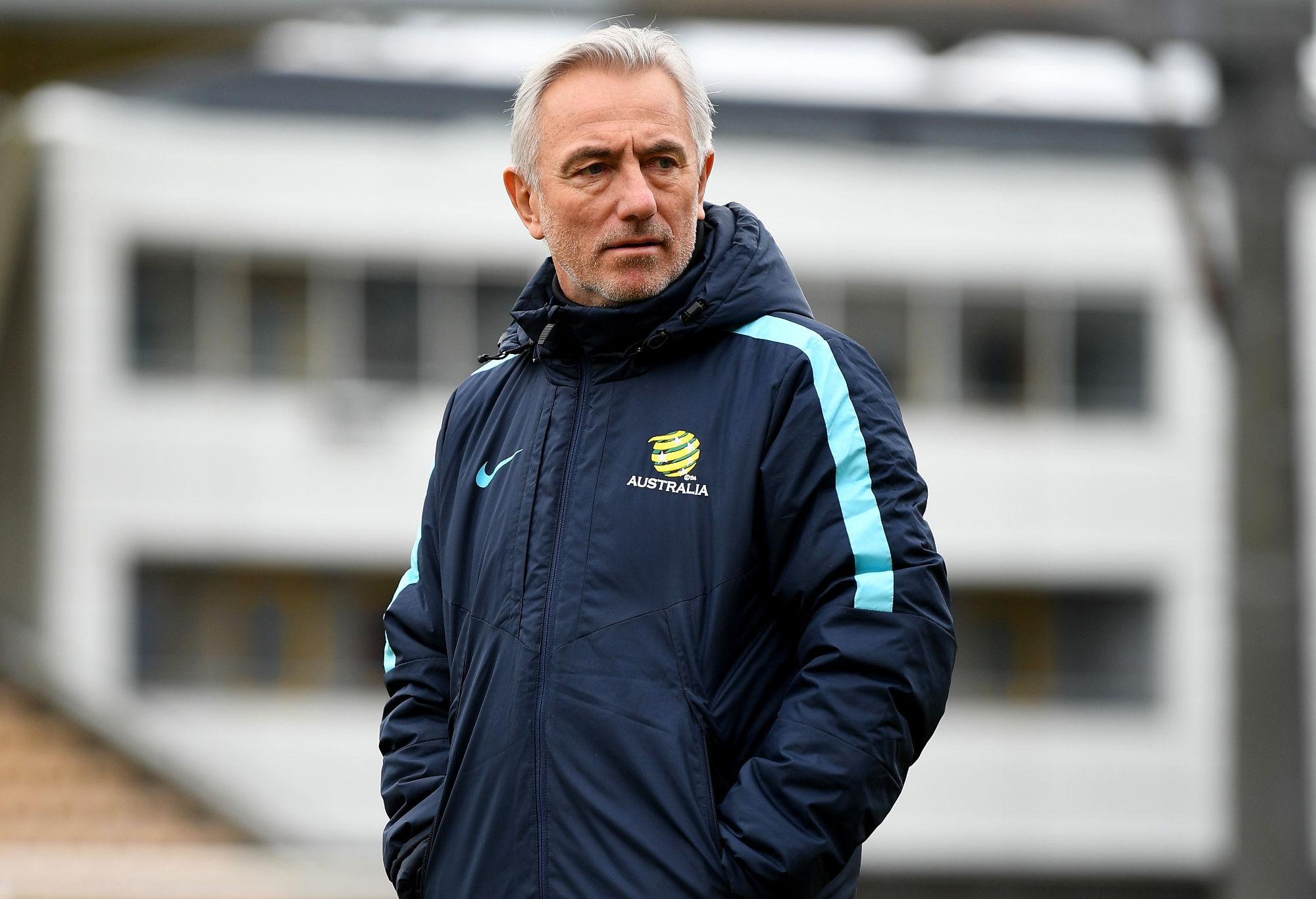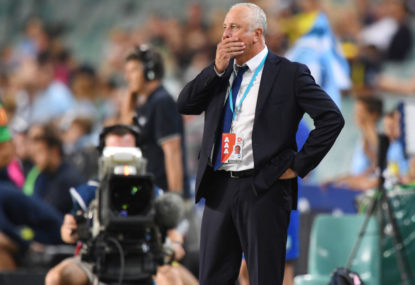Blind Freddy is aware of the fact that the Socceroos need to find the net more frequently from open play.
The reasons behind the issue are numerous and form links in a problematic chain that has seen the expert penalty taking of Mile Jedinak become Australia’s most consistent source of scoreboard success in recent times.
In a nutshell, a failure to combat midfield pressure when playing against quality opposition exposes the Socceroos’ flaws in control and poise on the ball.
Possession can be maintained negatively, yet far too often the vital ingredient of possession with purpose is lost.
Australia’s 2018 World Cup qualifying campaign was littered with examples of dominant possession statistics, at odds with the number of clear chances created and thus, those converted.
The knock on effect of that opposition pressure is a reduction in the speed of ball movement, as the Socceroos attempt to build attacks. A composed and structured defensive unit can then sit comfortably in the knowledge that the Socceroos won’t hurt them with slow and stodgy passing through the centre of the pitch.

Socceroos Mile Jedinak and Mark Milligan. (SAEED KHAN/AFP/Getty Images)
In turn, the service to the front three generally provides difficult and remote opportunities, as the wider attackers such as Matthew Leckie and Robbie Kruse attempt to access width pushing forward.
The subsequent quality of their crosses is often symptomatic of a slow and stifled attack rather than one featuring any explosiveness or the genuine speed and ability required to get in behind defences.
The end result sees the focal point in attack receiving chances few and far between and standing forlorn in the box, as cross after cross is cleared with ease: often mishit, misfired or misdirected.
Bert van Marwijk’s influence on the team in Russia was obvious. His commitment to a back four in which he believed did solidify things defensively and many felt it kept the Socceroos in the hunt until late in their third group match.
Aaron Mooy, Tom Rogic and Jedinak were his preferred trio in midfield and only Jackson Irvine appeared to have also gained his trust. Andrew Nabbout’s motor was clearly the kicker when it came to his selection of the man up front.
Using the tools he had, van Marwijk gelled a team as best he could yet a miracle worker he is not. Despite his best efforts, none of the aforementioned cracks and limitations were glossed over. He did however, empower the Socceroos in whom he trusted and asked for the performance of their lives against France. And deliver they almost did.

Former Socceroos coach Bert van Marwijk. (Photo by Michael Regan/Getty Images)
Against Denmark we saw glimpses of quality yet failed to capitalise on an opponent ripe for the picking. By the time the team took to the pitch against Peru they looked tired and jaded.
Asking a team for an emotional and monumental effort on any given day can work once, perhaps even twice yet the reality is that something more sustainable is eventually required.
Short term coaching appointments however, are not conducive to sustainability.
The Socceroos continue to spring eternal hope and the next man charged with navigating the immediate and medium term challenges ahead is Graham Arnold.
His first order of business will be to address the goal drought and develop an effective, realistic and productive method to reverse the trend. Easier said than done of course yet Arnold has already alluded to his preferred approach.
I must admit, his comments last week about the mental side of the game, sports psychology and belief, didn’t exactly fill me with confidence.
[latest_videos_strip category=”football” name=”Football”]
Claiming that the lack of goals could potentially be a result of players soaking up negative commentary through social media and becoming convinced of their own limitations if an interesting observation, however, I was hoping for something a little more scientific.
He took a veiled swipe at van Marwijk by suggesting that the players did far too much unnecessary running in Russia and declared his intention to play a ‘possession based game’ similar to the one that had served the ‘higher teams’ well at the World Cup.
That intention does fly a little in the face of his former club Sydney FC and its ability to absorb and counter effectively. One hopes his words are not hollow rhetoric promoting a system of play unachievable by the players at his disposal.
A possession based game with purpose will obviously be the intention. We have been there before, with varying success under Ange Postecoglou before another brief encounter with Dutch pragmatism.
However the new mentor approaches things, let’s hope for some early success and continued development of players like Josh Risdon, Daniel Arzani and Andrew Nabbout who are new to the national team.
They are key components in the Socceroos’ future, along with Massimo Luongo and Jackson Irvine in midfield.
While the psychology of goal scoring is relevant, I hope Arnold also faces the limitations in skill and execution in the squad, implements a realistic game plan and keenly sources the next wave of Socceroos astutely.
The mind is a powerful thing yet possessing the right plan for the bodies in your service is just as important.































































































